Patrick Findeis, Berlin (D)
Patrick Findeis wurde 1975 in Heidenheim geboren und lebt in Berlin.Er liest einen Auszug aus einem Romanmanuskript mit dem Titel "Kein schöner Land".
Download text in:
Word file format (*.doc)
PDF file format (*.pdf)
Information on the author
Videoportrait
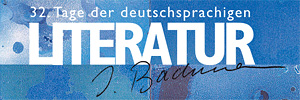
Patrick Findeis
No land more lovely
(extract from the manuscript of a novel)
Späht heard the siren when it was still far away, and through his open barn door saw the ambulance drive by. He ran out into the farmyard. Behind the bare trees on the corner by the turning, the blue lights were quivering. So it's stopped outside the Gambrinus, he thought: which poor sod this time, he wondered. The farmer's wife opened the window of the front room and called out: what is it?
Close that hole, all the heat's escaping, said Späht and carried on looking across to the inn. From his house he saw its long side, the leaded windows of the ground floor taproom, the first floor roughcast and unpainted and its single, mullioned and transomed window unlit. At least they had given Uwe a room with a view, he thought. Patting the sawdust from his thighs and shaking his trouser legs, he raised his hat and ran a hand through his hair. If someone has died, he thought, they'll turn the blue light off on the way back. He waited. It had turned cold early this year, no Indian summer at all. And for the past week he had felt winter approaching, in his left elbow, when he woke at five in the morning. Rolling out of bed to stand in the dark bedroom, he would wrap his hand around the joint and flex his arm a few times. Späht scratched his nose and the ambulance came around the corner. The blue light was twitching, the siren was off. What might that mean, he thought: it's not all that bad, then: it's not really worth it any more. The vehicle accelerated past him, its brake lights flickered on at the crossroads, it turned. Späht looked up the gently rising village road for a while longer. The low houses, street and pavement clean. Since the slaughterhouse had taken all his cattle there was no longer a trail of slurry dribbling from the farmyard to the track. And since he had sold the fields time drifted on, couldn't be reckoned. He briefly wondered about having a smoke, although he had stopped years ago. All of a sudden, that's what people think, he thought, wiped his mouth with the back of his hand and went back into the barn.
The carpenter's bench stood in the middle. Even though it meant he had to walk more to fetch the tools, as they hung on the wall to the right of the door, that's how he had wanted it. The farmer's wife had shaken her head and said, man, what are you doing?, when he had dragged the bench from the corner into the middle of the empty barn. He had looked at her and she had said again, man!, and he had answered: And I don't tell you what to do.
She hadn't talked to him again all day and evening.
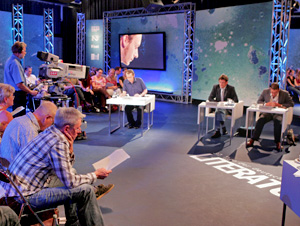
Späht ran his thumb over the edging that he had glued on that morning and took the flint paper to remove a burr. He had the taste of thyme and garlic in his mouth from the soup at lunch, as if the plastic of his dentures had absorbed the taste. He tried to nudge something hard out from between his teeth with his tongue. Then he wiped his fingers on his trousers and took out his dentures. He sucked something out from between his incisors. It didn't taste of anything any more. He pushed his dentures back in and pressed them up with his tongue, until they stuck to his palate. He took the milling cutter from the bench and plugged in the lead, put it down and looked out the barn door. Since he had stopped drinking, he hadn't been back in the Gambrinus. The temptation was too great, he convinced himself, and yet knew that Alfons had never forgotten how Späht's father had been to the refugee children: because of you we really had to go to war, to fetch you back to the Reich! he had said, and had had to wash the boys down every evening in the yard with the hosepipe: because they are such filthy pigs! And then having to rub them down with the linen sacks himself: the mucky pigs don't do it properly themselves!
Späht turned the cigarette box over, switched on the cutter and set to work, remembering that he didn't want a protruding edge on the bottom. Why did I always rush to church, he thought, as he thought every day: and heap them with money, the pansies: and then they tell me I didn't raise my son close to the Lord. He heard steps outside, raised his head and saw the farmer's wife cross the yard holding a shopping bag. His gaze followed her until she was out of sight, then only the section of road with its one and a half houses could be seen, framed to the left and right by the barn door. And once again a terrible silence lay in everything, as if long ago his life had slipped away, as if nothing, not even he himself, had a role any more. He turned the cutter on again and watched the blades rotating. The nag had been gelded with two bricks, he thought: and perhaps mother ought to have done the same with father: then it might not have rubbed off: times aren't what they were, he thought. The machine's motor slowed down to a stop and he put it to the side. The blades must be blunt again, the edge was rough and splintered. If I could give it to Alexander with the business, he thought: then I wouldn't have to buy a new one. He had once had a son and just the sound of that had made him proud. It had made him feel like a man. Farmer Späht and his son, he had thought at the christening and couldn't wait for the baby to become the boy he was destined to be. He couldn't - when his wife had slammed the magazines down on the table as he came in for lunch. He had looked at the torn magazines on the table, just touching the corners of the pages with his fingertips, licking his fingertips in an automatic reflex as he did, to turn them, and bile constricting his throat, a taste like iron.
Späht just couldn't - he began to measure the edging and held his breath. He finished off the sawing with his mitre saw. The wood didn't splinter. He drew the blade through the mahogany in short strokes and blew away the shavings. The work didn't calm him. Alexander sitting up straight at his place at the table that evening, and the farmer's wife, who sat at his side, her hands propped up on the tabletop, her fingers pointing in at themselves: swear, she had screamed: that you aren't one of them! swear to me! And the son didn't do anything, except that his Adam's apple moved up and down. Swear! she spat out and looked over at Späht. He looked at his son's hands, and mouth, and long slender neck and how his Adam's apple was twitching, as she barked: shame on you, shame on you! Their son turned his head and looked up at him from below. What's he looking at on me, Späht wondered and took his hands out of his trouser pockets. And all at once Späht just felt tired and weak. That it was too late for a good beating, he had probably known, and in any case he didn't want to touch Alexander, who stood up and headed for the stairs, leaving his empty chair half pushed back into space. Shame on you, the wife said quietly once more, when the boy came down the steps minutes later and crossed the worn floorboards, going out to his car holding a bag. That night Späht had seen Uwe in his boots and coat on his way home. That's a good boy, in spite of all appearances, he had thought then and looked at the clock.
Now Späht took the spatula and lined the groove with glue. He positioned the edging and screwed the clamps tight. He wiped his fingers. The wife came over the yard and into the barn. She stopped in front of him and looked at him, the empty shopping bag swaying in her hand.
It was Alfons, she said, as if she were saying that it was almost vespers: in his head, a stroke or something.
But he's still going, she said: can't break him that easily.
Späht shrugged.
Perhaps they should drive to the hospital in Gefrieß, she said.
Why? asked Späht, pretending he was busy. Well, them being neighbours for so long and him knowing Alfons since they were boys, she said: it'd only be right!
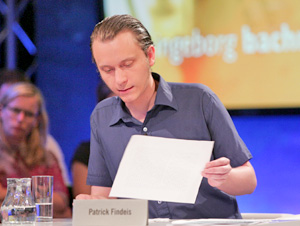
And what with our boys having been in the same class, said Späht: have that in common too, and that theirs is a dead junkie and ours a pervert; and looked at his wife, who clasped her neck with the hand holding the bag, and looked at the ground. She left the barn, after Späht had started the cutter, and disappeared into the house. He turned the cutter off and put it down. He pressed his outstretched hands against the workbench to support himself. That he hadn't properly forgiven him was his problem, he thought: what could I have done. And that Späht was the farmer's son and Alfons only the child refugee who helped out in the fields, and that every evening the family sat at the dinner table for a thick, meaty stew and the refugees were given a jam butty out in the yard. And that later, after Alfons and Angelika had married, he had always had the feeling over in the Gambrinus that Alfons kept a close eye on Späht's tips: not enough wasn't right, too much also wasn't right: because he certainly didn't need Späht's charity. And that it gave Alfons a sense of justification when Späht sold the animals and the land. While Alfons was the first to blame him, for all the Poles swamping the village because of the new development on Späht's land.
Späht looked at the cigarette box. He stood in his empty barn and leant his head back until it was resting on his nape. At least my son is still alive, he thought: and if Alfons goes Uwe's way now, that's only right. What Späht's old mother had said: the worst thing is for your child to die before you. He certainly hadn't seen Alfons mourning when he had gone over to offer his condolences after Uwe's death. Alfons had looked at the ground, so that Späht was staring directly at the bright parting in his dark hair. And there hadn't been a notice of death in either the Gefrieß or the Goldshof paper. If the father goes Uwe's way now, that's only right, he thought. That they hadn't closed the shop and inn for a week out of mourning, but out of shame, he could well believe, having seen Angelika creep around the village or hide behind her car's steering wheel, passing everyone without a look or greeting.
Späht brought his head back to the level and looked out. It was almost dark now. Above him the lamp hung from the ridge beam in the high roof. The lead sloped diagonally down through the barn to the wall. The lamp cast a narrow circle of light around the workbench, and a wider, murky margin. It was almost black at the back where the tractor and plough had stood. Where he had hidden as a child when the butcher came, because his father had threatened: he'll take you away if you don't behave! And now it would all die. And if he hadn't still been too young, he would have lain on his back and never got up again.
He loosened the clamps from the box and looked at it. He didn't like the edging he had added at the bottom. He shrugged. Then he lowered the box onto the bench and closed his eyes. If only I could give Alexander the cutter, he thought. But as the wife had said: a dead son might be better than a gay one: because you have to respect the dead. And Späht had nodded, remembering Alexander standing on the worn boards with his bunch of keys in his hand. And his son's eyes had roamed here and there, as if they were looking on the floor or on the narrow stairs for a life that he could live there. And his larynx had gone up and down under his skin. He hadn't said anything else, just opened his hand and let the keys fall to the ground.
Späht screwed the circular saw's guide rail to the right length. He tested the saw blade, to see if it ran clean and straight, turned the saw on, its whining like an echo of past days, when there had always been noises around him and movement. He sawed the lid out of the wood and put the pieces on the bench. Before he pulled the plug for the construction lamp he looked around his workshop. The two stalls back there he'd had to pull down a good year ago now. The ground was browner and on hot days still smelled of the animals who for eternities had followed each other in there, to give milk or to fatten up. Späht bit his dentures together and felt the pressure on his jaw. He pulled the plug and it went dark in the barn, the distant noises of the trunk road suddenly louder. He pulled the barn door closed and clamped on the padlock.
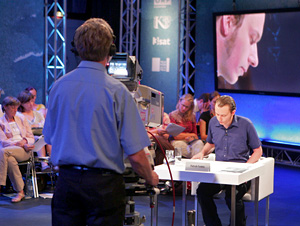
It was warm in the front room, the farmer's wife was standing in the kitchen. He sat down at the table and started to read the Gefrieß daily again. Since that morning he had forgotten what had happened in the world. He read the names in the deaths column quietly to himself and read the women's maiden names too. No one that he knew there. Perhaps soon, he thought and put the paper down and wondered if he should go to the Gambrinus again, were Alfons now no longer there. He rubbed his hands together, they made a sound like sandpaper drawn against the grain of the wood. That is what he had for all the years of work.
Could she take his good suit to the dry-cleaners, he called his wife. She appeared in the doorway and looked at him: come on! she said.
I can feel it, Späht said: he begrudges Uwe all that space in the grave.
The farmer's wife shook her head: that would be tough for Angelika, she said.
Späht nodded: unfortunately, not for him.
She disappeared into the kitchen and he heard her fussing about. Alexander and other classmates had come back for Uwe's funeral. They had seen their son for the first time in months. And Späht would have given anything to say to him, that he, that it shouldn't be like that. But Späht had just stood there and lowered his head and couldn't really mourn properly for Uwe then.
He looked out the window and only saw the room lit up and himself in the reflection. He wanted to get up, but stayed sitting, laying his hands and forearms flat on the table and waiting. Finally the phone rang.
Wrong number! he shouted at it.
That will be Rößner about the chapel, his wife called from the kitchen.
Späht knew that it could only be Rößner about the chapel. He continued to watch the phone, as if that would help him recognise the caller. As if the chapel were my private property, he thought, as he always thought when the phone rang at this hour and they had finished for the day with the renovation work over there. And he could imagine Rößner holding the phone to his ear - while his helper packed away the tools - and waiting for Späht to answer that he'd be over to lock the door, as he had unlocked it at lunchtime.
Wrong number! he called again and his wife came from the kitchen and picked up.
Yes, she said: I'll tell him.
What's wrong with you? she asked.
Späht shrugged. He ground his plastic teeth, until the ridges of his jaws went numb from the pressure: does it belong to me, that thing up there? he asked.
But it's an honour for us and more than we deserve, for you to have the only key: your father would have given anything for it, you know that!
He's still turning in his grave about the farm, said Späht and the farmer's wife turned away, leaving the room: you! she said: you!
His wife had kept the cutting from the paper with the photo of Späht handing the priest a cheque and the two of them shaking hands. He couldn't remember the headline now. There was a banging in the kitchen. And she can just carry on, he thought, got up, took the key from the sideboard drawer, went past the coat-stand and out the door. He took a few paces and then turned around. She had probably not noticed he had left. He left the car in the garage. He stopped in front of the Gambrinus. The windows in the bar and in the flat above it weren't lit. In the glow from the street lamp, the house stood out against the black sky. The flat-roofed annex at the back, which housed the shop, lay half in the dark. Späht had helped them back then with the building work, shortly after Alfons and Angelika had married. She had only taken Alfons because he had a moped, he had always been sure of that. Späht was getting cold and started walking again, casting another glance at the place over his shoulder. At the end of the dead-end road he reached the open country, walking along between the fields. To his left the new development rose in the night like a spaceship. Satellite dishes on every balcony. There was an earthy smell, mouldy as wet hay. He still knew every inch of ground out here. If the father goes his son's way, that's only right, he thought and recognised the chapel on the hill in the distance, just a shadow in front of the darkness. He made a line for it over the heavy, ploughed soil, then felt the gravel track under his shoes and picked up his pace. The air still had a softness in it, but not for much longer and then the wind would be really cutting. The seasons were perhaps the only thing that he really felt: they come and go, thought Späht, standing in front of the six-sided chapel with its copper roof, whose restoration he had paid for in full; and still people had said behind his back: it wasn't enough, not considering all the money he got from the council. But the fact that the church was now full again, since the Poles had arrived, everyone ignored that. Späht turned the handle and opened the door. He recognised the outlines of the Virgin Mary and of Joseph on her left and of St Anthony of Padua on her right. The Holy Child in her arms lay hidden in the dark, the moonlight from the narrow, grilled windows was not strong enough. He stood still in front of the figure of the Mother of God. He smelled old wood, thinner and wet mortar. Späht balled his hands into fists, tensed his whole body and lowered his head: wasn't it enough? he said and didn't himself know what he meant: couldn't it have been enough? he said and lifted his gaze and thought, as looked into the incomprehensible face of the Virgin, who was half in shadows: one step at a time, we go one step at a time.
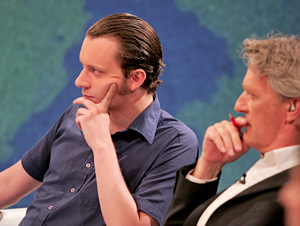
Späht raised his fists to his face and breathed out. And in that one long moment he could hear the cattle bellowing in the distance, he tasted the deep, damp earth of the freshly ploughed furrows, and louder and louder the mindless bellowing of the animals. Times aren't what they were, he thought: time is this and always the same, he thought: and I don't know what to do now; and perhaps he really felt the endlessness behind the land that he had never left and that he had given everything to until now: and all those who came before me and brought me to this place in time, he thought and knew that he wouldn't ever be able to change anything.
Späht backed out of the chapel. The saints once again just outlines on the wider, back wall of the six-sided space. He stood in the open air, pushed the door shut and locked it. He leant his head back until it was resting on his nape and looked up to the heavens, the crescent moon hid behind a cloud. He raised his fist and shook it: so what, he said: better than fucking nothing, he said and left. In the distance headlight beams passed by on the trunk road. If he could keep moving, nothing else would happen.
Translated by Stefan Tobler

